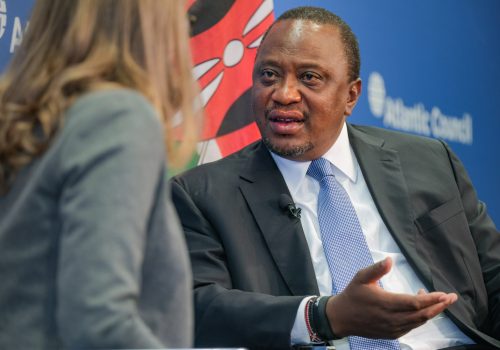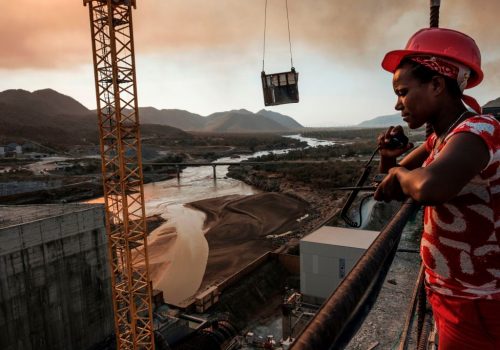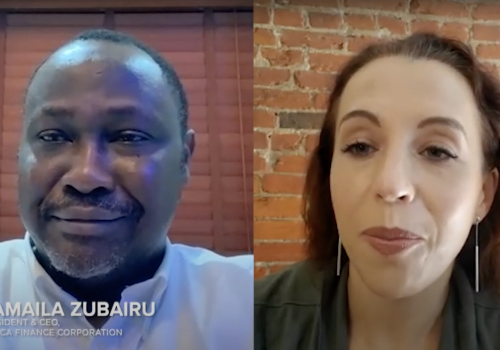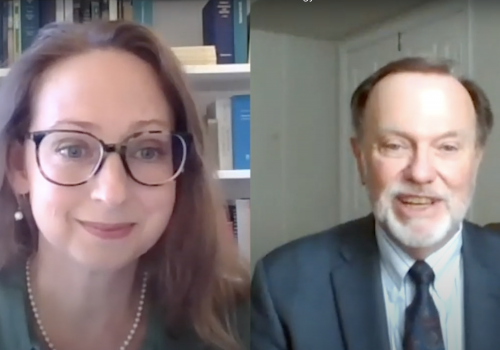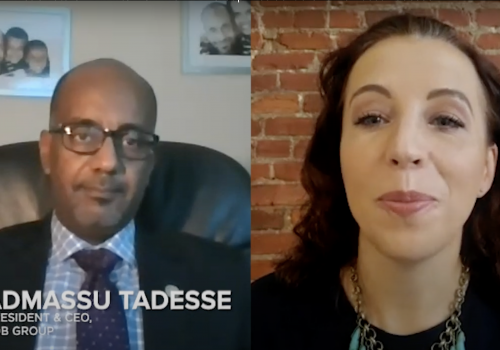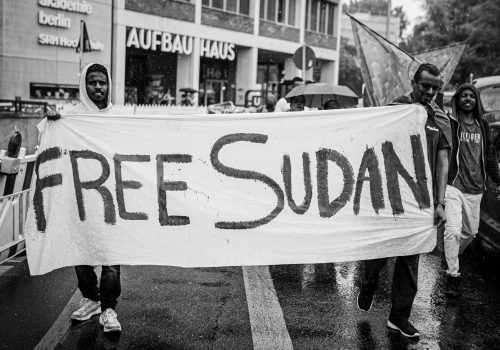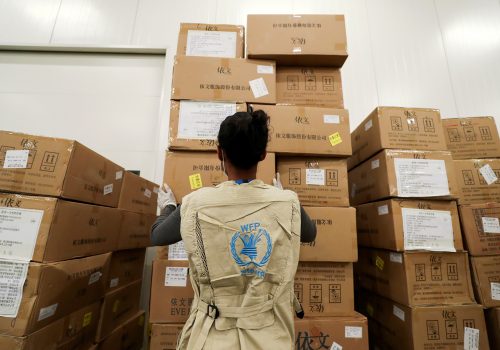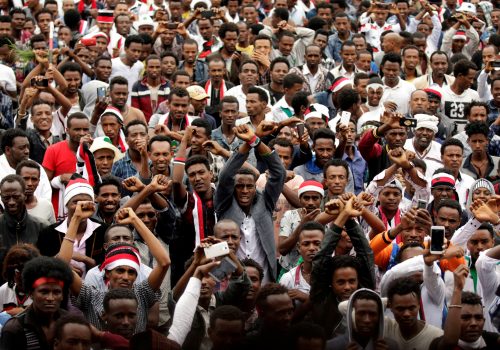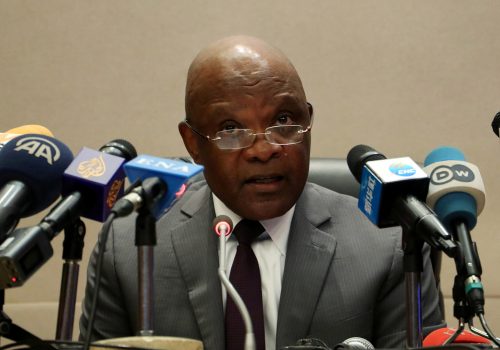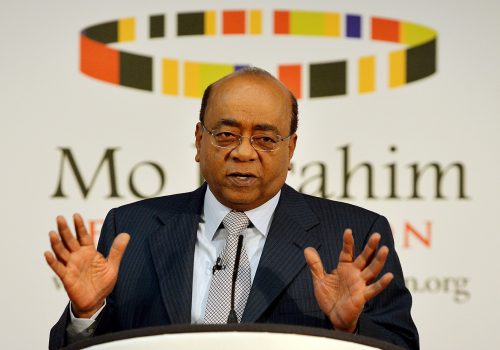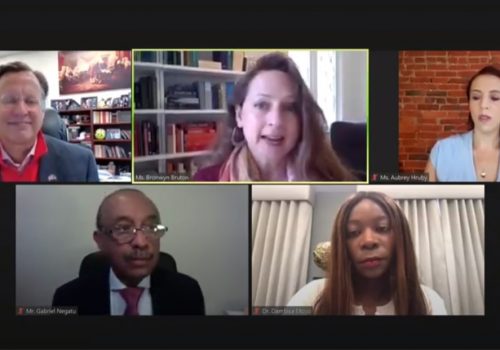African outlook 2021: The Africa Center reflects on 2020 and looks ahead
African nations have mostly escaped the heavy death toll and hospital bed shortages faced by Western countries, but the COVID-19 pandemic has dealt a disproportionately severe blow to the continent’s economic ambitions. Fortunately, robust collaboration between African public and private sectors, and particularly innovative financing measures from African development institutions—including members of the Africa Center’s new Afro-Century Initiative, such as the Africa Finance Corporation and Trade and Development Bank—have helped to address what Kenyan President Uhuru Kenyatta described (in public remarks to an Atlantic Council audience in June) as an urgent need for fiscal space.
The Africa Center’s Coronavirus: Africa page documented the early impact of the pandemic, and our virtual convenings with the leadership of the Africa Centres for Disease Control and Prevention and the World Food Programme highlighted the early successes and agency of African stakeholders in combatting the crisis. The likelihood of greater pan-African collaboration in the wake of COVID-19 was a key finding of the Center’s report on great power competition in Africa in the post-COVID landscape. That report was the result of a newly-launched collaboration with the Policy Center for the New South, which seeks to explore and reframe perceptions of Africa through a series of paired research papers written from both North and South lenses.
COVID-19 did not slow the pace of political developments in Africa this year. Sudan’s transitional government achieved a watershed when the US State Sponsors of Terrorism (SST) designation was finally lifted and a massive aid package was bestowed on the nation in exchange for normalization of relations between Khartoum and Tel Aviv. The Africa Center’s convenings and analysis on this topic provided thought leadership across the political spectrum that helped steward the SST lifting to a successful conclusion. The Center’s robust analysis of the conflict in northern Ethiopia between the administration of Prime Minister Abiy Ahmed and members of the former authoritarian regime helped to shape perceptions of the dispute both regionally and in Washington, DC.
Looking ahead, it’s clear that in 2021 the new Biden administration will be challenged by the need to repair and reinvigorate key bilateral relationships on the continent (including Ethiopia, Nigeria, and South Africa), and there is a major question mark over how many of the former administration’s initiatives will be abandoned. Prosper Africa’s launch was problematic, but in concert with the launch of the new US International Development Finance Corporation (DFC) and its equity capability, it signaled a concrete shift in US priorities to “trade, not aid” that was long overdue. The Africa Center marked that transition with a summit-level conference hosted in cooperation with the DFC, which laid out the United States’ all-of-government approach to Africa policy and, importantly, underscored both the strong bipartisan support for Prosper Africa’s expanded toolkit and the essential role of African development finance institutions in the process.
An event under the auspices of our new Afro-Century Initiative—which unites a coalition of African development finance institutions in an effort to forge a more authentic, optimistic narrative on Africa—capped the Center’s year of programming. An esteemed panel of economists and business leaders offered the following observations and predictions for what 2021 has in store for Africa’s economies:
What to watch for in 2021:
- African markets have an advantage in 2021 and beyond, says Renaissance Capital’s Global Chief Economist Charlie Robertson, because the continent has been the least hurt by COVID-19 relative to other regions (a story similar to that of the 2008-2009 global financial crisis). Consequently, low interest rates in the West could push more institutional investors to chase high yields in Africa by increasing portfolio exposure in African fixed income and equities.
- Getting Africa to “catch up” is the wrong framing, says AfroChampions Co-Founder Edem Adzogenu. To him, the attitude must rather be: “can you turn in a completely different direction and perfect another model that passes the others but also learns from them.”
- The African Continental Free Trade Area (AfCFTA) can be a “game-changer,” says the Africa Finance Corporation’s Chief Economist Rita Babihuga-Nsanze, but there is still a lot of work that needs to be done to build an enabling environment, especially when it comes to infrastructure.
- While China will remain a key financing partner, the scaling back of Belt and Road Initiative lending will provide space for new international lenders and other financial institutions to support the continent’s growth ambitions, says Standard Chartered Bank’s Chief Economist for Africa Razia Khan. According to Babihuga-Nsanze, African development finance institutions can play a critical role in closing the financing gap that emerges.
- Chinese growth—not lending—is going to lift the whole continent, says Robertson, but African countries need to invest in the right infrastructure. China’s GDP is likely to grow about $2.3 trillion next year and another $2.3 trillion the year after: equaling the size of the entire African market. This growth could help drive commodity price increases and create a lever for wealth creation in Africa, lifting the whole continent. Yet, key to cashing in on this Chinese growth will be Africa’s ability to build infrastructure to enable it, while forgoing projects that do not.
- Value addition and industrialization are two critical trends, according to Babihuga-Nsanze. The post-COVID reset will provide a push to shore up local supply chains and double down on the building of local industrial parks, which can promote investment.
- Ghana is a market set for growth, Khan and Robertson agree. But Nigeria must make good on its diversification promises, while South Africa’s political reforms will have investors watching.
- Observers are missing the huge SME-driven informal sector, notes Adzogenu, as well as the huge creatives space. For African Development Bank Chief Economist and Vice President Rabah Arezki, the bottom-up wave of fintech and innovation will transform the continent, including in rural areas where growing digitization could be critical for improved agriculture. To Africa Center Senior Fellow Aubrey Hruby, digitization is the single most significant trend coming out of 2020 for Africa.
The last word:
- “For a continent that has the youngest population, [Africa] should be the center of the world. I mean this should be the center for the freshest ideas for innovation and everything, and the center for which people can come and bring their ideas to bring growth that will benefit the entire world as well.” –Edem Adzogenu, AfroChampions
Explore highlights from the Africa Center’s year of programming

The Africa Center works to promote dynamic geopolitical partnerships with African states and to redirect US and European policy priorities toward strengthening security and bolstering economic growth and prosperity on the continent.
Sign up for the AfricaSource newsletter, which provides in-depth analysis and incisive commentary by the Africa Center’s experts on the people and events shaping the present and future of the world’s most dynamic regions
Image: Ugandan soldiers serving under the African Union Mission in Somalia (AMISOM) load an assortment of items donated by the Italian Government and CARITAS as part of the COVID-19 containment and mitigation effort to help local Somali communities in their efforts to combat the spread of the virus on June 7, 2020. (Flickr/AMISOM Public Information/Steven Candia)

